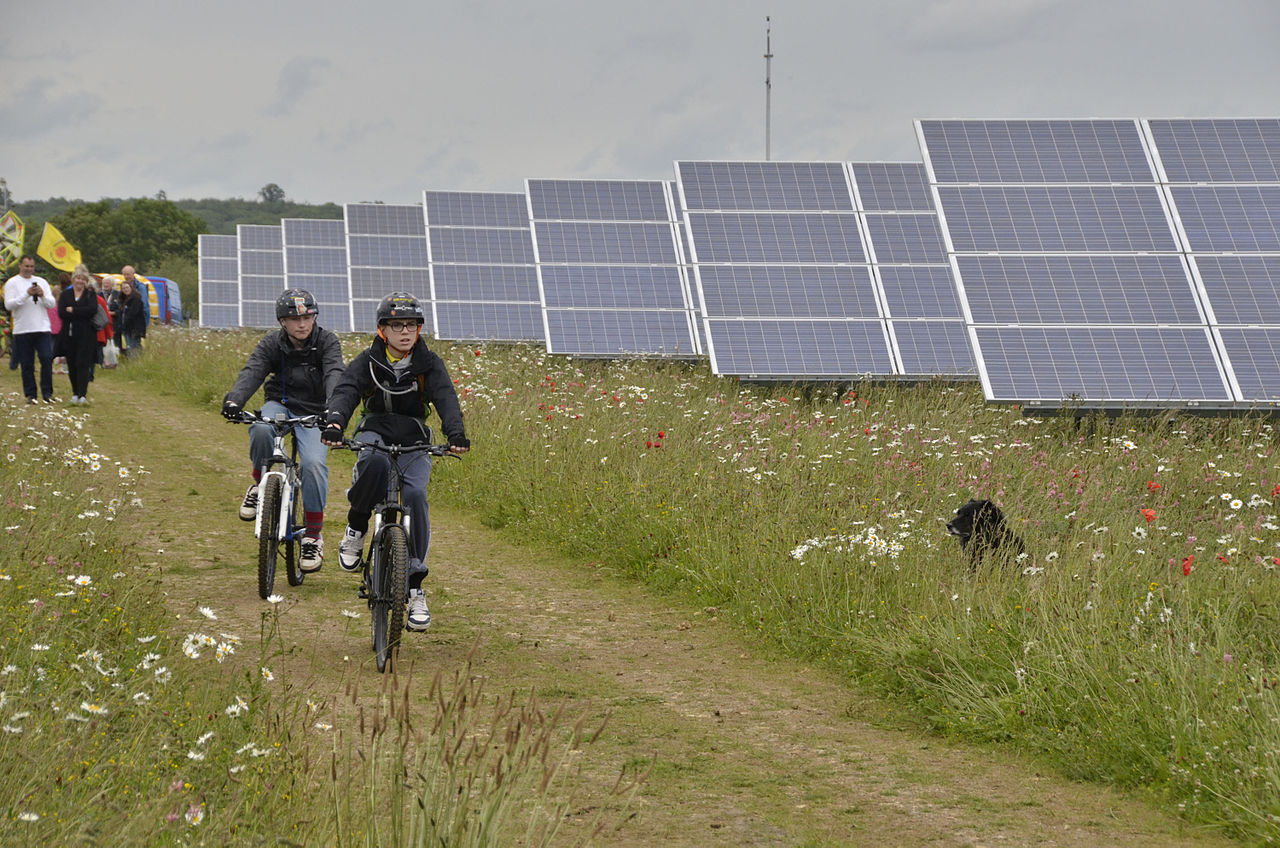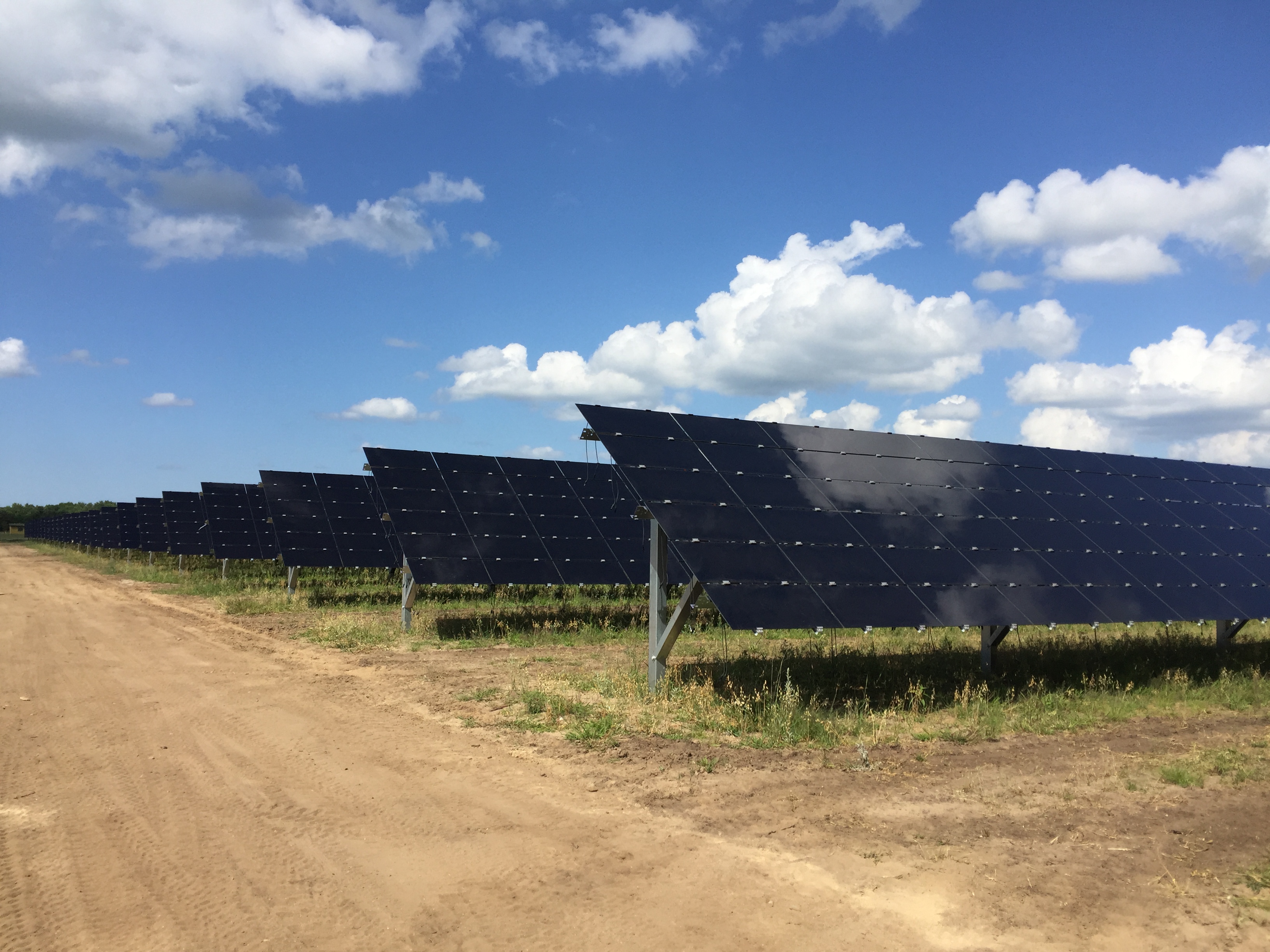If you live in the Pepco region in Maryland, sign up for community solar today!
If you are a Delmarva customer, sign up here!
(For all other regions, see sign-up information below).
Sign up here to get updates on community solar projects in your neighborhood!
Go Solar & Save Money
What is Community Solar?
Maryland’s community solar pilot program allows families to take advantage of the cost savings of solar without having to own their home or install equipment on their property.
Community solar allows customers that rent, have shady roofs, or are otherwise unable to install solar on their residences or commercial buildings to buy or subscribe to a portion of a shared solar system. The subscriber’s share of the electricity generated by the project is credited to their electricity bill, just as if the solar system were located at the home or business.
How Does it Work?
Under Maryland’s community solar program, households can subscribe to a small share (two kilowatts or more) of a larger solar project sited in their community but not on their property. The solar project delivers all the power it produces into the grid, and the local utility redistributes this power among its customers. The household then receives a credit on their monthly utility bill for the amount of electricity their share of the system produced. This arrangement is called “virtual net-metering.”
Solar projects  may vary from community to community, depending on the solar developer, the utility company that serves the region, and the customer’s requirements. Regardless, all the projects will be designed so that solar subscribers will see lower rates. This is welcome news in the wake of the disastrous Exelon-Pepco merger. Mere weeks after getting final approval for its merger, the energy behemoth Exelon-Pepco filed for massive rate hikes in Maryland.
may vary from community to community, depending on the solar developer, the utility company that serves the region, and the customer’s requirements. Regardless, all the projects will be designed so that solar subscribers will see lower rates. This is welcome news in the wake of the disastrous Exelon-Pepco merger. Mere weeks after getting final approval for its merger, the energy behemoth Exelon-Pepco filed for massive rate hikes in Maryland.
Maryland’s five-year community solar pilot program has started! The community solar operators, known as subscriber organizations, are currently enrolling customers. Maryland is hoping to install 200 megawatts of solar energy through this plan.
Sign up to let us know you’re interested in community solar, and we’ll let you know about projects as they come online in your utility territory.
Who Can Sign Up?
Anyone! Anyone who has an account with a utility in Maryland (except SMECO) and meets the individual requirements can join.
Importantly, the pilot program was designed to provide low- and moderate-income households an opportunity to participate in community solar.
This commitment to making solar accessible to everyone is critical because, even as solar electricity takes off, working families account for only a small fraction of all residential solar installations. This inequity is stark in Maryland. According to the Center for American Progress, only one percent of residential solar has been installed in Maryland communities where median household incomes are below $40,000. Maryland’s community solar program is a major step towards a more equitable clean energy economy.
If you live anywhere other than the Southern Maryland Electric Cooperative (SMECO) service territory, you can sign up for community solar today! Neighborhood Sun and CleanChoice Energy are taking subscribers. Go to their websites to sign up and see what’s being offered in YOUR region.
General Information
Sign up:
- Click HERE to go to Neighborhood Sun’s general sign-up page.
- Click HERE to go to CleanChoice Energy’s sign-up page.
Region-Specific Information
Pepco
If you live in the Pepco region of Montgomery or Prince George’s Counties, you can sign up right now through this page.
Delmarva
If you get your energy from Delmarva Power, you can sign up right now through Neighborhood Sun to get locally produced solar power AND have a $100 donation given to CCAN in your name. Sign up at www.neighborhoodsun.solar/ccan today!
Cleanchoice Energy: BGE customers can save up to 10% off their utility rate by joining a local Community Solar Farm.* No rooftop
BGE
Neighborhood Sun and CleanChoice Energy are both offering projects in BGE territory. If you sign up with either of them in BGE, they will make a donation to the Climate Access Fund to expand access to solar power in low- and moderate-income communities.
Neighborhood Sun: BGE customers will save 5% off their utility rates in a 3-year contract. More info: https://neighborhoodsun.solar/bge-projects/. Low-to-moderate income households will save 25% off their utility rates in a month-to-month contract with no credit score required. More info: https://neighborhoodsun.solar/lmi/
- Click here to sign up for community solar with Neighborhood Sun: https://neighborhoodsun.solar/ccan/
CleanChoice Energy: BGE customers can save up to 10% off their utility rate by joining a local Community Solar Farm.* No rooftop required and no money down.
- Click here to sign up for community solar with CleanChoice: https://cleanchoiceenergy.com/communitysolar/ccan/
For all projects, you’ll use electricity exactly as you do now and BGE will continue to maintain the wires. And, there’s no new equipment or home visit needed. Low-income customers are eligible for exclusive benefits. There are a limited number of spots available, so sign up today for solar savings with no installation or maintenance.
*Terms and conditions vary by project. Customers should review all details in Contract or Subscription Agreement
Have any questions or want to learn more about community solar in your neighborhood? Email Victoria Venable, CCAN’s Maryland Director, at victoria@chesapeakeclimate.org.
RESOURCES
- Community Solar = Solar for Everyone Fact Sheet, CCAN, April 2019
- Click HERE for Neighborhood Sun’s frequently asked questions and answers.
- Click HERE to request further information from CleanChoice.
- A Just Transition for Baltimore: From Pollution and Dangerous Fossil Fuels to Clean Energy and Good Jobs, CCAN, June 2017
- Low and Moderate Income Verification guidelines.
KEY ARTICLES
- “Standard Solar funds 24-MW community solar portfolio in Maryland”, Solar Builder Magazine, 11/17/21
- “Community solar project sets aside capacity to benefit LMI residents, PV Magazine”, 11/16/21
- “This co-op solar project will be owned by the community members it benefits,” Fast Company, 11/8/2018
- “Community solar coming to Kent Island,” The Star-Democrat, 10/19/2018
- “Affordable solar power is within reach for people living in Maryland,” Baltimore Sun, 8/13/2018
- “Maryland launches community solar program, creating new green energy opportunities — but also potential conflicts,” Baltimore Sun, 8/2/2018
- “Maryland strives to install 200 megawatts of solar in three years,” The Frederick News Post, 04/05/2017
- “What Maryland’s New Guidelines Mean for Community Solar,” Groundswell, 03/18/2016

